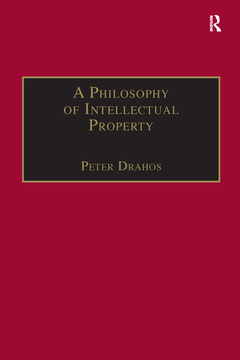A Philosophy of Intellectual Property Applied Legal Philosophy Series
Auteur : Drahos Peter

Date de parution : 11-1996
15.6x23.4 cm
Date de parution : 11-2016
15.6x23.4 cm
Thèmes d’A Philosophy of Intellectual Property :
Mots-clés :
Abstract Objects; abstract; Intellectual Property; objects; Intellectual Property Rights; rights; Intellectual Property Law; law; Intellectual Commons; commons; Negative Liberties; negative; Patent System; liberty; Civil Society; protection; Common Law Copyright; plant; Patentable Subject Matter; variety; Natural Property Rights; Incorporeal Things; North American Free Trade Agreement; Threat Power; IOI; Unmet Consumer Demand; Negative Community; Hegel's Analysis; Creative Labour; Original Position; Sovereignty Effect; Trademark Law; Instrumental Duties; Primary Good; Coercion Claim



